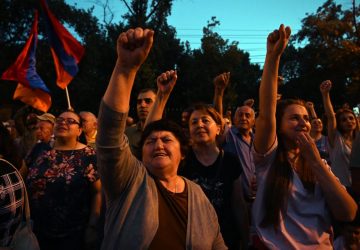In a key step towards normalizing ties between the historic rivals, Armenia has returned four border villages it seized decades ago to Azerbaijan.
The move, which has sparked protracted protests in Armenia, represents an important move towards reaching a comprehensive peace agreement after years of fruitless talks mediated by Russia and Western countries.
The Caucasus countries, both former Soviet republics, fought two wars in the 1990s and in 2020 for control of the breakaway region of Nagorno-Karabakh.
Azerbaijan recaptured it last year in a lightning offensive, ending three decades of Armenian separatist rule over the enclave, and prompting more than 100,000 locals to flee into Armenia.
Yerevan’s disastrous defeat provoked a rift with historic ally Russia, which Armenia accuses of failing to defend it in the face of Azerbaijani threats, despite a security treaty.
After months of diplomatic tensions, Moscow announced Friday it had recalled its ambassador “for consultations.”
Foreign Ministry spokeswoman Maria Zakharova did not provide a reason for the recall, which is typically seen in diplomatic circles as an extreme step in the face of worsening ties.
Armenia’s security service confirmed on Friday that its border guards had taken up new positions in the east of the country, reflecting a recently brokered border demarcation deal that cedes the villages to Azerbaijani control.
Azerbaijan’s Deputy Prime Minister Shahin Mustafayev announced separately that his country’s border guards had taken over control of the four settlements.
‘Important milestone’
Armenian Prime Minister Nikol Pashinyan agreed in March to return the four abandoned villages, which were seized in the 1990s, as part of efforts to secure a lasting peace deal.
And the two countries agreed earlier this month on the new demarcation of 12.7 kilometers of their border, returning the villages of Baghanis Ayrum, Ashaghi Askipara, Kheyrimli and Ghizilhajili to Azerbaijan.
Pashinyan has hailed the agreement as “very important” for Armenia’s sovereignty and said it “brings our security and stability to a new level.”
The territory ceded by Yerevan is of strategic importance for landlocked Armenia because it controls sections of a vital highway to Georgia.
Armenian residents of nearby settlements say the move could cut them off from the rest of the country, and accuse Pashinyan of unilaterally giving away territory without getting anything in return.
Pashinyan has said Armenia will build new roads in the area over the next few months.
The premier’s decision has sparked weeks of anti-government protests in Armenia, with thousands of demonstrators led by charismatic cleric Bagrat Galstanyan demanding Pashinyan’s resignation.
A fresh anti-government protest is scheduled for Sunday.
A 5.8-kilometer section of the border near the Armenian village of Kirants will be guarded “according to a transitional scheme until July 24,” Armenia’s national security service said on Friday.
The village mayor has said locals will be allowed to use a section of the road that is to be transferred to Azerbaijani control – until new roads are built.
Local media reported that some Kirants residents have dismantled their houses and fled the village, which is located just meters (yards) from the redrawn border.
Mariam Harutyunyan and Emil Guliyev, with AFP





